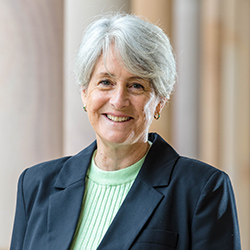Researchers from the Centre for the Business and Economics of Health (CBEH) are making a difference in the lives of people with prostate cancer.
Health economics research from CBEH was an important contributing factor to a further $35.4 million in funding for the Prostate Cancer Foundation of Australia (PCFA) Prostate Cancer Specialist Nursing program, announced by Minister for Health and Aged Care Mark Butler in November.
In Australia, the number of prostate cancer cases is increasing, but so too is the 5-year relative survival rate, meaning patients and their families are more likely to live with the disease and the side effects of treatment for many years.
Nurses with specialist training in prostate cancer play an important role in addressing the specific health and psychosocial needs of these men, providing dedicated care throughout their cancer journey.
Key statistics
- Prostate cancer is the most diagnosed cancer in Australia, with more than 25,000 Australian men diagnosed each year.
- Between 1982–1987 and 2012–2016, 5-year relative survival rates for prostate cancer improved from 58% to 95%.
- Men living in regional or rural areas have a 24% higher chance of dying than those living in metropolitan areas.
- Aboriginal and Torres Strait Islander men have a 50% higher risk of dying from prostate cancer.
- 1 in 5 men with prostate cancer will develop anxiety and depression, while 72% of men won’t seek help for distress.

The research team, led by Dr Kim Edmunds, and supported by Prostate Cancer Specialist Nurses Sally Sara and Bernie Riley, used a Social Return on Investment (SROI) approach to identify costs and estimate the benefits associated with the delivery of the specialist nursing program.
“Our analysis determined several significant benefits, including improved health-related quality of life, reduced emergency department (ED) presentations and hospitalisations and reduced burden on clinicians and nursing staff,” Dr Edmunds said.
PCFA Chief of Mission and Head of Research Professor Jeff Dunn AO commended the research team for their work.
“The team’s comprehensive analysis demonstrated that the Specialist Nursing program run by PCFA returns a net social benefit to the community of $1.65 for every dollar invested,” he said.
Key findings
- An improvement in health-related quality of life valued at more than $25 million.
- Almost $6 million in reduced ED presentations and hospitalisations.
- Almost $7 million in reductions in clinical consulting time.
- More than $4 million in reductions in nurse practitioner coordination time.
- Reduced travel costs and productivity losses.
- Reductions in missed appointments.
“These findings were backed by rigorous methodology and a balanced approach that helps to underpin the value and integrity of programs such as ours,” Professor Dunn said.
“The economic analysis represents a world’s best practice modelling of a world’s best practice program.”

Prostate Cancer Specialist Nurse Sally Sara said the program helped patients feel heard and listened to, in turn created a sense of belonging and valued connection to a supportive network.
“Advocacy on behalf of the patient within multidisciplinary teams, in relation to health care and support service access alongside the provision of up-to-date information, can positively impact a patient’s distress, resilience, confidence, quality of life, and ultimately, survival,” Ms Sara said.
Dr Edmunds noted these services had a particularly positive impact on people living in regional and rural areas, who often don’t have the same access to health care and support services as people living in cities.
“Shared management of the patient’s cancer journey can make a considerable difference to a person in a regional or remote community where they may otherwise feel isolated and out of touch,” Dr Edmunds said.

CBEH Interim Director Professor Haitham Tuffaha added that the additional Government funding would strengthen the placement of specialist nurses across Australia in partnership with health service providers and have the potential to help more men with prostate cancer.
“Specialist nurses support patients with prostate cancer through all stages of their disease by coordinating medical care, supporting partners and family members, improving access to multidisciplinary specialists and providing continuity of care,” he said.
PCFA’s Commonwealth and community-funded Prostate Cancer Specialist Nursing Service now comprises 110 nurses at 90 different locations nationwide, as well as a telenursing service.
Contact: Dr Kim Edmunds, k.edmunds@uq.edu.au; Professor Haitham Tuffaha, h.tuffaha@uq.edu.au.



